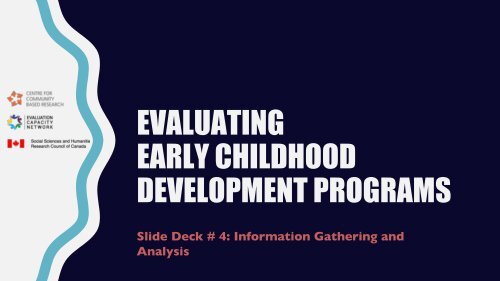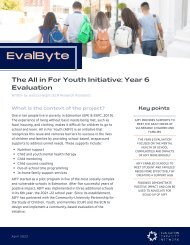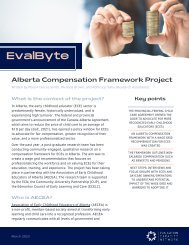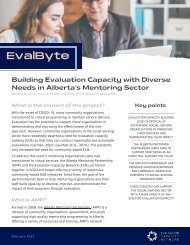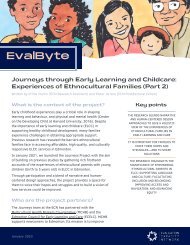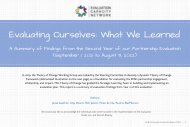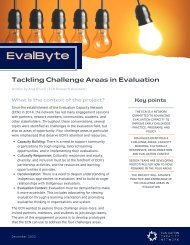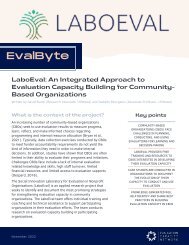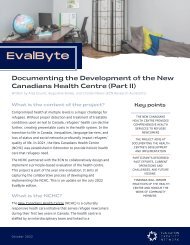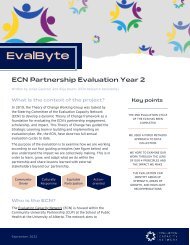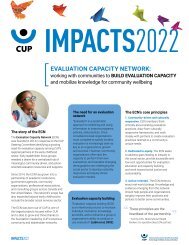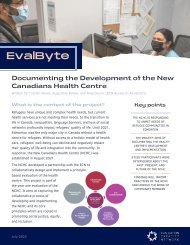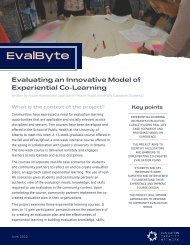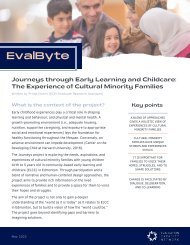Information Gathering and Analyis
- No tags were found...
Create successful ePaper yourself
Turn your PDF publications into a flip-book with our unique Google optimized e-Paper software.
EVALUATING<br />
EARLY CHILDHOOD<br />
DEVELOPMENT PROGRAMS<br />
Slide Deck # 4: <strong>Information</strong> <strong>Gathering</strong> <strong>and</strong><br />
Analysis
How To Use These Slide Decks<br />
Review the slides <strong>and</strong> practice on the evaluation workbook.<br />
look for # to<br />
find the<br />
corresponding<br />
exercise page on the<br />
workbook!<br />
Visit www.evaluationcapacitynetwork.com to access<br />
• The complimentary evaluation workbook<br />
• Complimentary live webinars’ recordings
#1 Laying the<br />
Foundation<br />
#4 Acting on<br />
Findings<br />
Welcome Back!<br />
#2 Evaluation<br />
Planning<br />
#3 <strong>Information</strong><br />
<strong>Gathering</strong>/Analysis<br />
Slide deck #1: Introduction to community-based evaluation<br />
Slide deck #2: Laying the foundation in community-based evaluation<br />
Slide deck #3: Community-based evaluation planning<br />
Slide deck #4: <strong>Information</strong> gathering <strong>and</strong> analysis<br />
Slide deck #5: Acting on findings<br />
You are<br />
here!
The Four Phases Of Community-based<br />
Evaluation<br />
Relational:<br />
• Negotiating mobilization of<br />
knowledge <strong>and</strong> people<br />
Technical:<br />
• Sharing learnings<br />
• Initiating new action<br />
#1 Laying the<br />
Foundation<br />
Relational:<br />
• Negotiating goals <strong>and</strong> roles<br />
Technical:<br />
• Identifying stakeholders <strong>and</strong> organizing<br />
steering committee<br />
• Identifying assumptions about evaluation<br />
• Highlighting the theory of change<br />
• Identifying the purpose of the evaluation<br />
#4 Acting on<br />
Findings<br />
USE<br />
evaluation<br />
#2 Evaluation<br />
Planning<br />
DO<br />
evaluation<br />
Relational:<br />
• Negotiating meaning<br />
<strong>and</strong> learning<br />
Technical:<br />
• <strong>Gathering</strong> information ethically<br />
• Analyzing <strong>and</strong> summarizing<br />
#3 <strong>Information</strong><br />
<strong>Gathering</strong>/Analysis<br />
Relational:<br />
• Negotiating perspectives to include<br />
Technical:<br />
• Determining the evaluation questions<br />
• Developing methods for collecting<br />
information<br />
• Developing an analysis plan
What This Slide Deck Covers<br />
Phase #3 <strong>Information</strong> <strong>Gathering</strong> <strong>and</strong><br />
Analysis<br />
1. Gather information ethically<br />
2. Analyze & summarize information<br />
#3 <strong>Information</strong><br />
<strong>Gathering</strong>/Analysis
1<br />
Gather <strong>Information</strong> Ethically
Data <strong>Gathering</strong><br />
Ensure that…<br />
• Data is gathered according to the plan<br />
• People are trained adequately to gather data<br />
<strong>and</strong> deal with specific populations<br />
• There are regular meetings with steering<br />
committee to reflect on data collection process<br />
<strong>and</strong> learnings<br />
• Any issues are raised with the steering<br />
committee<br />
• Pilot tests are run before your main tests<br />
• Ethics is considered <strong>and</strong> followed throughout the<br />
evaluation
Ethics<br />
What is ethics in<br />
evaluation?<br />
• Doing no harm—both on an individual <strong>and</strong> community level<br />
• Ensuring there is informed consent<br />
ü People must be aware of the purpose of the evaluation<br />
ü People need to agree to participate<br />
• Throughout the evaluation process, one must:<br />
ü Protect all stakeholders involved (especially the vulnerable)<br />
ü Be aware of who is (or will be) using/accessing data<br />
ü Recognize power dynamics, problematic relationships <strong>and</strong> ulterior<br />
motivations
Ethics In Research With Children<br />
Addressing children’s vulnerability<br />
• Acquire “real” informed consent (i.e., use age-appropriate language <strong>and</strong><br />
ensure an underst<strong>and</strong>ing about the study <strong>and</strong> its purpose)<br />
• Be aware of unequal power relationships <strong>and</strong> build relationships of trust<br />
<strong>and</strong> mutual-accountability (i.e., involve adults who children know <strong>and</strong> trust in<br />
data gathering)<br />
• Ensure that the research environment <strong>and</strong> methods suit children’s<br />
interests <strong>and</strong> circumstances<br />
• Inform children of the circumstances that may require sharing their<br />
information with others (i.e., health risks)<br />
Einarsdóttir, J. (2007)
Your Turn<br />
Within your program or community…<br />
• What ethical challenges might<br />
you face when researching with<br />
children?<br />
• What steps could you take to<br />
address these ethical challenges?
Three ways to ensure your community-based<br />
evaluation addresses ethics<br />
1. Train community researchers according to ethical st<strong>and</strong>ards <strong>and</strong> practices<br />
2. Have the steering committee play an ongoing role in discussing ethical issues<br />
3. Seek external support for a formal ethics review to ensure your evaluation does no<br />
harm <strong>and</strong> maximizes benefits to the community<br />
Strategies<br />
for Ethical<br />
Practice<br />
Community Research Ethics Office (CREO)<br />
• Does ethical review for community-based research <strong>and</strong> evaluation<br />
• CREO mission is to strengthen <strong>and</strong> support community research by<br />
responding to the needs of community researchers to easily access an ethical<br />
support <strong>and</strong> review process.<br />
• CREO’s four core principles are<br />
o<br />
o<br />
o<br />
o<br />
Respect for Persons<br />
Concern for Welfare<br />
Concern for Justice<br />
Respect for Community<br />
• More info: www.communityresearchethics.com
Four Ethical Principles Used By CREO
OCAP – Indigenous Ethical Principles<br />
OCAP originated in 1998 at a<br />
brainstorming session held by the<br />
National Steering Committee (NSC)<br />
of the First Nations <strong>and</strong> Inuit<br />
Regional Longitudinal Health<br />
Survey, later incorporated as<br />
the First Nations <strong>Information</strong><br />
Governance Centre (FNIGC) in 2010<br />
•More info: https://fnigc.ca/what-wedo/ocap-<strong>and</strong>-informationgovernance/<br />
OCAP<br />
Ownership – “of information by an<br />
Indigenous community collectively in the same way that<br />
an individual owns their personal information”<br />
Control – “over all aspects of research <strong>and</strong> information<br />
management processes which impact them…<br />
from conception to completion”.<br />
Access – “to information <strong>and</strong> data about themselves<br />
<strong>and</strong> their communities, regardless of where it is<br />
currently held…to manage <strong>and</strong> make decisions<br />
regarding access to their collective information. This<br />
may be achieved, in practice, through st<strong>and</strong>ardized,<br />
formal protocols.”<br />
Possession – as “a mechanism by which ownership<br />
can be asserted <strong>and</strong> protected. When data owned by<br />
one party is in the possession of another, there is a risk<br />
of breach or misuse.”
2<br />
Analyze And Summarize <strong>Information</strong>
Quantitative vs. Qualitative Data<br />
Quantitative data …<br />
• Data is in the form of<br />
numbers<br />
• Is concerned with<br />
measurement<br />
• Provides breadth of<br />
underst<strong>and</strong>ing<br />
Qualitative data …<br />
• Data is in the form of words<br />
<strong>and</strong> stories<br />
• Is concerned with meaning<br />
• Probes for the lived<br />
experience of individuals
Overview Of Qualitative Analysis<br />
Words <strong>and</strong> images are the source of analysis<br />
• Qualitative analysis is interpretive – it searches for meaning<br />
• Qualitative analysis is concerned more with building theory<br />
than it is with testing theory<br />
• Qualitative analysis can be an iterative process<br />
• Analysis starts after some data has been collected. Further data is<br />
gathered on the basis of that analysis.<br />
• Qualitative analysis typically is more time consuming that<br />
quantitative analysis
Steps In Qualitative Analysis
Steps In Qualitative Analysis
Overview Of Quantitative Analysis<br />
Numbers are the source of analysis<br />
• Data analysis brings theoretical ideas formulated at the<br />
beginning of the study with evidence (the data) collected in the<br />
process of research<br />
• The main task of quantitative data analysis is to assess whether<br />
the empirical evidence supports or refutes the<br />
theoretical arguments of the study<br />
• It does this by searching for patterns in the numbers by<br />
using mathematical <strong>and</strong> statistical techniques<br />
• Involves using software <strong>and</strong> creating charts/visual<br />
presentations of trends
Steps In Quantitative Analysis
Steps In Quantitative Analysis
Analyze Results Using Survey Software
Analyze Results Using Other Software<br />
To show descriptive frequencies<br />
Microsoft excel<br />
To p e r fo r m s t a t i s t i c a l t e s t s , e . g . ,<br />
chi square tests<br />
PSPP (http://pspp.awardspace.com/)<br />
To create your own<br />
customizable charts<br />
Piktochart.com
Be Open for The Unexpected<br />
Collect<br />
data according to the<br />
plan that was<br />
developed<br />
Consult<br />
with the steering committee if any<br />
changes are needed regarding the<br />
collection or analysis of the data<br />
Adjust<br />
as necessary
Bringing Together Qualitative And Quantitative<br />
First Analyze:<br />
Perform content analysis<br />
with qualitative data<br />
Perform statistical<br />
analysis<br />
with quantitative data<br />
By method<br />
What does each method say about<br />
the main research questions?<br />
By stakeholders<br />
What does each stakeholder group say<br />
about the main research questions?<br />
And Then Summarize:<br />
Across methods<br />
Across stakeholders
Recap<br />
#3 <strong>Information</strong><br />
<strong>Gathering</strong>/Analysis<br />
• Gather information ethically<br />
• Analyse & summarize information<br />
#3 <strong>Information</strong><br />
<strong>Gathering</strong>/Analysis
What Is Next …<br />
In slide deck #5, you will learn about acting on findings<br />
that includes:<br />
• Sharing learnings<br />
• Initiating new action
Need Additional Support?<br />
Ø Coaching <strong>and</strong> mentoring<br />
Ø Partnering on an evaluation<br />
Ø Proposal development<br />
Ø Evaluation support, training <strong>and</strong><br />
webinars using the Community Based<br />
Research Excellence Tool (CBRET)<br />
Ø Customized training in communitybased<br />
research <strong>and</strong> evaluation<br />
Ø For even more support, visit:<br />
www.communitybasedresearch.ca
And More Support…<br />
Ø Coaching <strong>and</strong> mentoring<br />
Ø Enroll in UEval, a one-week<br />
evaluation institute<br />
Ø Participate in the Eval Lab<br />
Ø Access online resources<br />
(lectures, modules, tip<br />
sheets)<br />
Ø Join the ECN Network!


